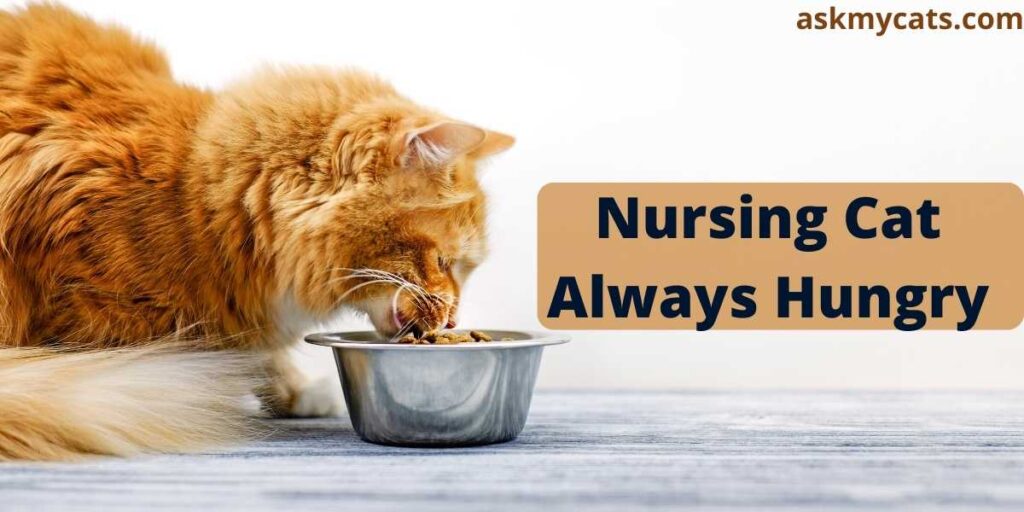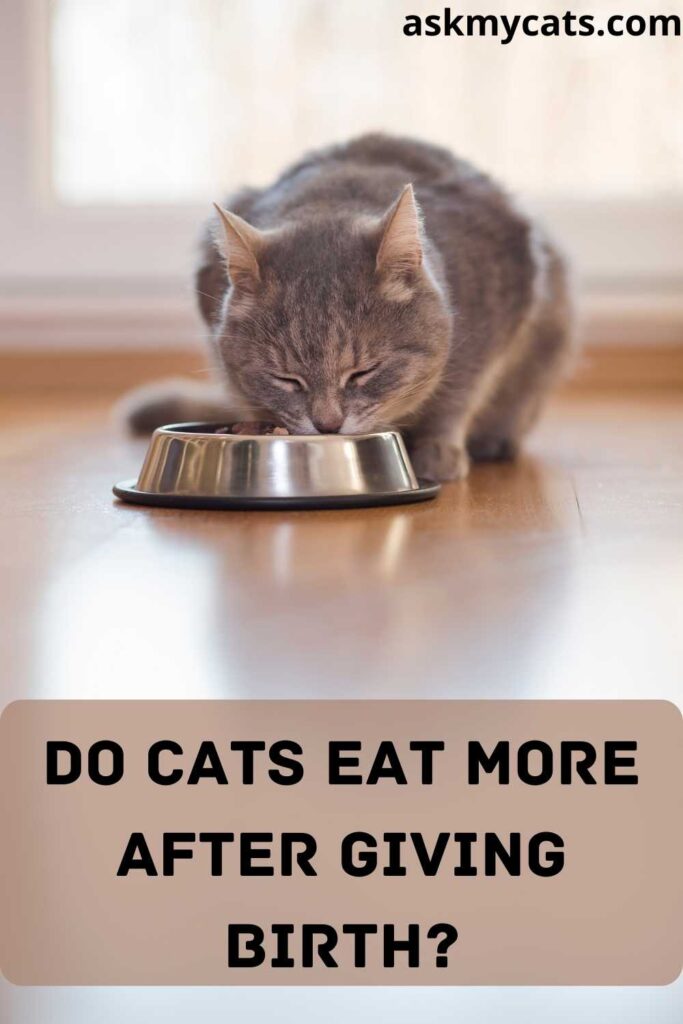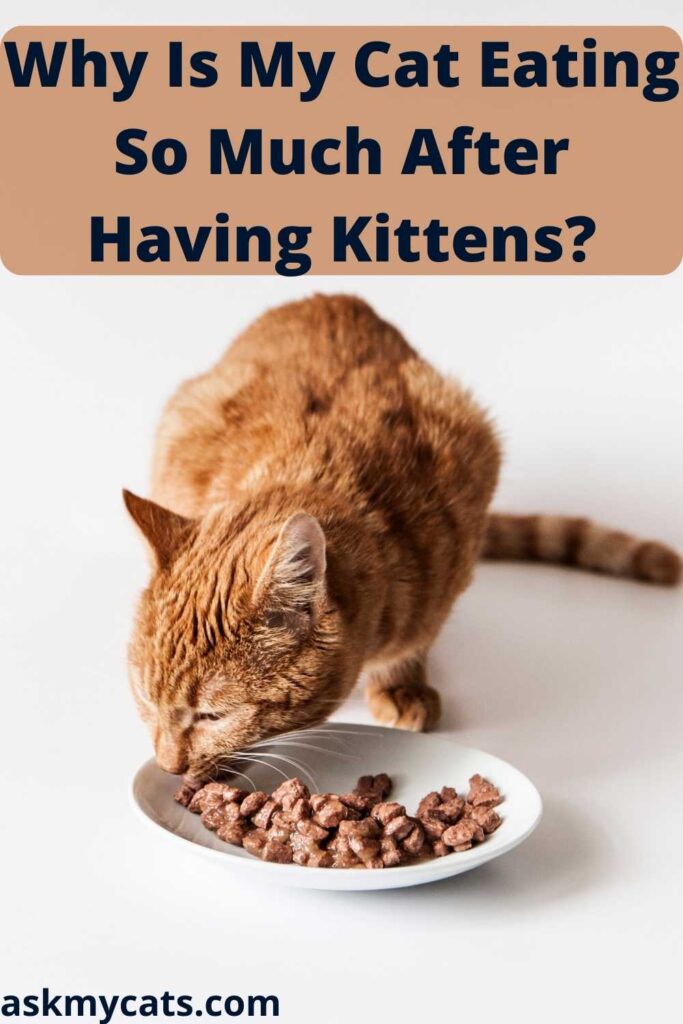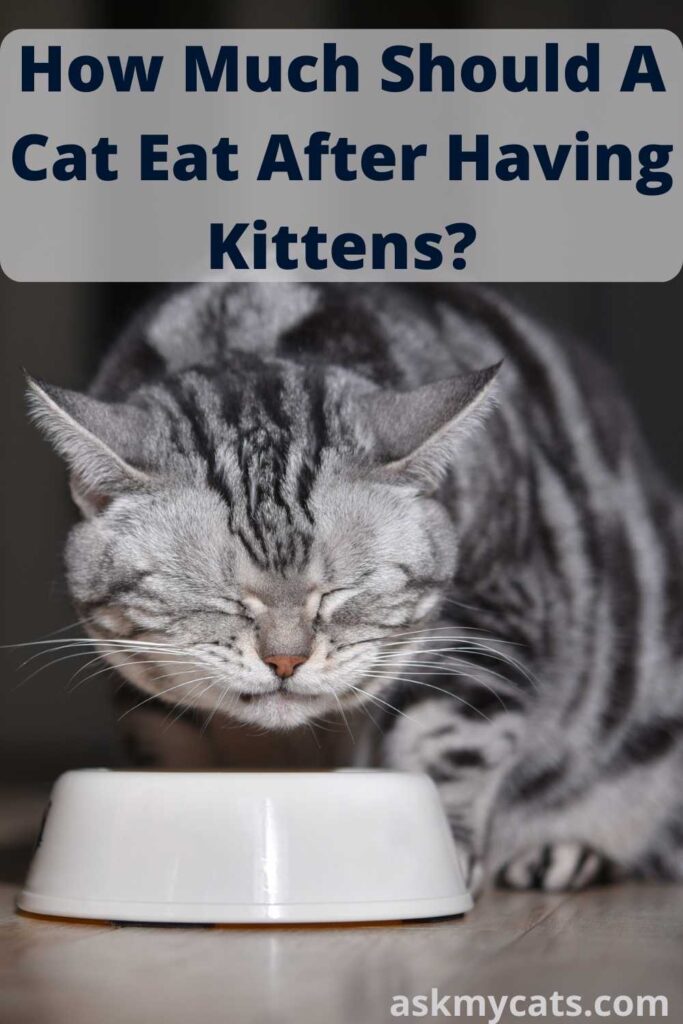We all know that cats enjoy their food, but have you ever wondered why your nursing cat is always hungry? As a cat owner, you are aware that a cat who refuses to eat necessitates a trip to the veterinarian.
However, you may be unaware that if your nursing cat is overeating, there may be more to be concerned about than just weight gain.
So, is a nursing cat being always hungry normal?
Yes, it is not normal for a nursing cat to always stay hungry as long as their weight is stable and they are not vomiting.
Keep reading the article to know more about the reasons why your nursing cat is always hungry.


Give Your Cat the Perfect Day
Get the Free Ebook!
Do Cats Eat More After Giving Birth?
Yes, cats do eat more after giving birth.

Cats have a nine-week gestation period. Pregnant cats, like humans, acquire weight steadily during the course of the pregnancy.
Pregnant cats’ weight gain reflects their energy requirements.
A pregnant cat’s energy requirements should gradually increase so that by the end of pregnancy, the cat is consuming 25% to 50% more calories than usual.
After giving birth, pregnant cats lose weight. Their dietary requirements, however, skyrocket.
Depending on litter size, energy requirements can be two to three times normal in order to produce enough milk to nourish the kids.
Water consumption is also essential for milk volume.
Give a nursing cat a nutrient-dense diet, such as kitten chow, to ensure she gets enough nutrients.
Increase the number of meals per day without increasing the amount of food at each meal. Feed her at her leisure, with full access to dry food.
Why Is My Cat Eating So Much After Having Kittens?
Here are some reasons behind your cat eating so much after having kittens: –

1. Increase In Nutritional Needs
After giving birth, pregnant cats lose weight. Their nutritional requirements, on the other hand, skyrocket.
Depending on the litter size, energy requirements can be two to three times normal in order to produce enough milk to nourish the babies.
Water consumption is also crucial for milk volume.
Give a nutrient-dense meal, such as kitten chow, to a nursing cat to ensure she gets enough nutrients.
Increase the number of meals in the day without increasing the amount of food at each meal. Feed her at her leisure, with full access to dry food.
You might be surprised to know the fact regarding Do Cats Know When To Stop Eating
2. Eating And Vomiting
Vomiting in home cats is not unusual. They frequently groom themselves, resulting in a lot of fur in their digestive tracts, which might produce a hairball.
If your cat is unable to pass a hairball in its feces, the fur will either come out when it vomits or become caught in its stomach or intestines.
If a hairball becomes lodged in your nursing cat, it will vomit its food because it will be unable to digest it.
If you suspect your nursing cat has a hairball or other foreign object in their gastrointestinal tract, take them to the clinic.
X-rays will reveal whether your cat needs to have a hairball or swallowed item removed.
This removal is often done surgically, but sometimes endoscopy is able to retrieve things from inside the esophagus or stomach.
Some cats vomit after eating on a frequent basis, even if their food is still intact or entire. Regurgitation is the act of vomiting whole food shortly after eating and is frequently caused by the cat eating too quickly.
Regurgitation can be easily avoided by slowing your cat down when it eats. Spread out your cat’s food on a cookie sheet or place objects that are too large to consume within its feeding bowl.
Special food dishes with finger-like projections or nubs can be purchased to make your cat work around them and hence eat slower.
Also, check out Cat Vomiting After Giving Birth: Is It Normal?
3. Eating and Gaining Weight
If your nursing cat is whining for food and gaining weight, despite what it is trying to tell you, this is a hint that you should feed your nursing cat less.
Some nursing cats, like some people, simply enjoy eating, and the more you feed them, the faster they’ll gain weight and become prone to a variety of medical complications.
Diabetes, joint problems, cancer, and other diseases are more frequent in overweight pets.
Most cats only need 1/4 to 1/2 cup of dry kibble each day, however, this can vary based on your cat’s activity level and the number of calories in your cat food.
Interesting Read: Pregnant Cat Eating A Lot: Reasons & Solutions
4. Eating And Losing Weight
Cats that appear to be constantly hungry and never gain weight are frequently diagnosed with a medical condition. These are some examples: –
- Intestinal parasites: Also known as worms, intestinal parasites feed on what a cat eats, stealing a big portion of the nourishment. This means that a nursing cat can eat and still feel hungry since it is feeding the parasites while receiving very little nourishment. Nursing cats can develop worms from fleas and being outside, but drugs can get rid of them. To find out what kind of parasites your nursing cat has, have your veterinarian perform a microscopic investigation of its feces. Although many monthly fleas and heartworm treatments contain intestinal parasite deworming medication, they do not protect your nursing cat against all forms of worms.
- Hyperthyroidism: Nursing cats with hyperthyroidism have an overactive thyroid gland, which causes them to be always hungry. Simple blood tests performed by your veterinarian can diagnose this condition in your cat. Medication can be used to treat it.
- Diabetes: It occurs when the pancreas fails to generate insulin adequately, causing the nursing cat to be unable to use the sugars produced by digestion for energy. Your nursing cat will be hungry since its body does not have enough energy despite eating. A diabetic cat may require insulin injections. Once the condition is under control, its appetite will return to normal.
- Cancer: It will be suspected if all other ailments have been ruled out and a cat is still constantly hungry and not gaining weight. Your veterinarian will advise you on additional testing alternatives.
Instead of overeating, if your cat is not eating properly and losing weight, you must read about Cat Losing Weight After Giving Birth: Reasons & Solutions
Fortunately, most cats simply enjoy eating, and their days revolve around naps and meals. Your cat is most likely a food-motivated feline as long as its weight is consistent, it isn’t vomiting or having diarrhea, and it isn’t acting oddly.
Interesting Read: Why Is My Pregnant Cat Not Eating?
How Much Should A Cat Eat After Having Kittens?
A cat should eat up to four times her pre-pregnancy diet after having kittens.

Given that mum will be her kittens’ entire source of food for the first eight weeks, maintaining a good quality diet while nursing is just as vital as providing nutrients for pregnant cats.
She will eat up to four times her pre-pregnancy diet to maintain her strength throughout this time!
Continue to give mum kitten formula until her litter has weaned to help her nurse happy and healthy kittens.
The increased calorie content and extra nutrients will keep her energy levels up, which is essential while caring for a naughty litter!
Maintain her portion levels when nursing, but increase the number of meals she receives. You can increase her fluid intake by adding a little water to her food (wet or dry) – this may also encourage the kittens to eat solid food, as it is easier to chew when moistened.
Mum’s milk production will gradually decline 6-8 weeks after giving delivery. At that point, you can gradually reduce her food intake until she is back to her pre-pregnancy portions.
Begin cautiously reintroducing adult meals over a 7-10 day period, just like you did at the start of her pregnancy.
You must have to check out What To Feed The Cat After She Gives Birth
Frequently Asked Questions
What is Polyphagia?
Polyphagia refers to a significant increase in appetite and food consumption. Because there are few disorders known to boost your cat’s hunger, the possible diagnosis is limited. However, physical diseases are not the only causes, as a psychological condition can also lead your cat to consume more food.
How do cats recover from increased appetite?
Once a cause has been identified and you and your veterinarian have devised the appropriate treatment plan, it is critical that you adhere to that plan in order to properly assist your cat’s recovery. When it comes to diet, your veterinarian can assist you in selecting high-quality cat food that will allow your pet to meet his or her daily metabolic requirements. Avoid overfeeding, especially with treats for good behavior, as this can lead to your cat developing a food habit.
Why are increased energy and fat so important in nursing cats?
Pregnant and lactating cats require a lot of energy, thus more energy and fat are vital. The most energy-intensive period of a cat’s life is nursing. Nursing cats require 2 to 6 times the amount of energy that a healthy adult cat does. The amount of food eaten that is actually absorbed by the cat’s body is referred to as digestibility. Because energy requirements are high and there is less physical space in the tummy of pregnant cats, excellent digestibility is critical.
Final Words
It is normal for an increased appetite in your nursing cat, however, if she is vomiting and her weight is not increasing it is a cause of concern, and a trip to the vet is advised.
If you have any questions, ask us in the comments section.
Interesting Read: Why Is My Cat Still Fat After Giving Birth?
